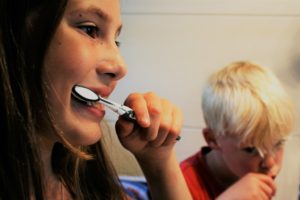 The mouth is the first stop for turning food into fuel. Teach your child good mouth care.
The mouth is the first stop for turning food into fuel. Teach your child good mouth care.
- Take your child to the dentist before treatment begins in case he or she needs any dental work done.
- Before beginning any dental work, clear it with the members of the child’s cancer healthcare team first. Dental work may not be safe for your child during cancer treatment or extra precautions may be needed if dental work is necessary, especially if blood counts are low.
- Teach your child to brush their teeth twice a day using toothbrush with soft bristles and toothpaste. Brush for two minutes and make sure to brush every tooth.
- Ask your child’s doctor if it is okay for your child to floss. If your child’s platelet counts are low, flossing may increase the risk of bleeding. If your child’s white blood cell counts are low, flossing may increase the risk of infection. If given doctor approval, gently floss to remove foods between teeth. You may need to assist your child with brushing and flossing until he or she is able to do so alone.
- If your child has braces, ask the healthcare team if they need to be removed during treatment to reduce the risk of infection.
- Rinse your child’s mouth several times a day with plain water or a mixture of ¼ teaspoon of baking soda and 1/8 teaspoon of salt in one cup of water.
- Tell your child’s doctor if his or her gums bleed or if there are white patches in the mouth. Both can be signs of infection.
Find more information and resources about childhood dental care at Mouth Healthy, a website from the American Dental Association.
